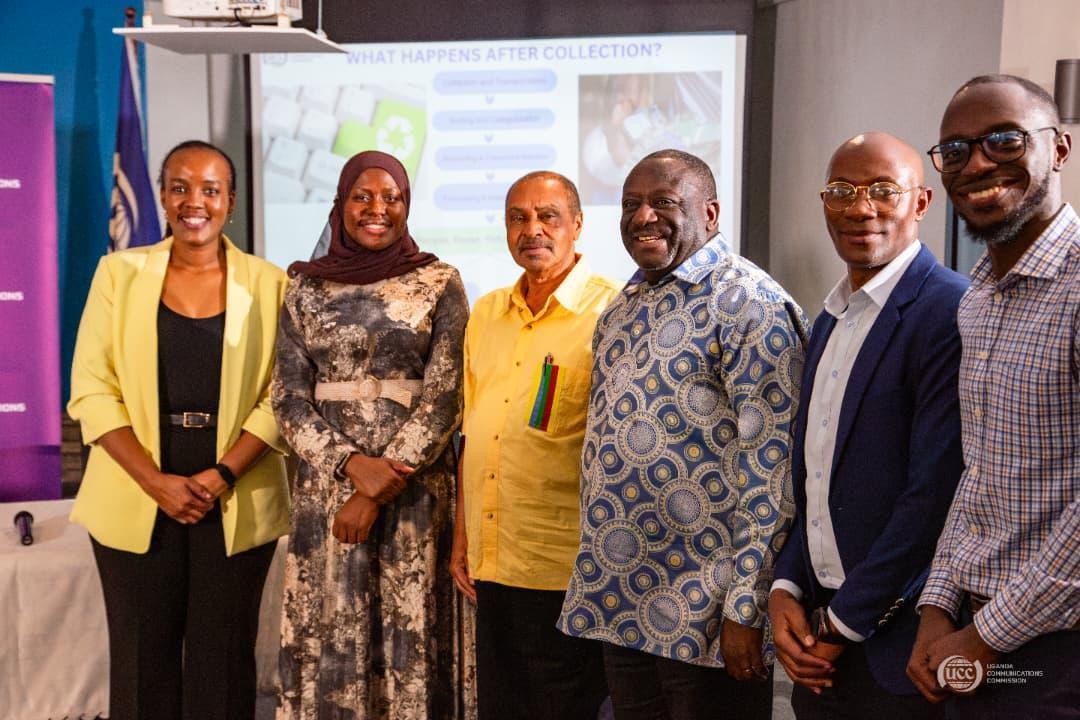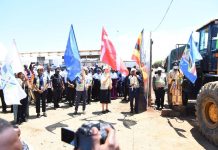Africa-Press – Uganda. The Uganda Communications Commission (UCC) has resolved a three-year dispute that had stalled the installation of telecom towers in Muyenga and Ntinda, paving the way for improved network coverage in the two Kampala suburbs.
The project, undertaken by American Tower Company (ATC), had faced resistance from some residents citing health and environmental concerns. However, UCC Executive Director Nyombi Thembo dismissed the claims as unfounded, noting that multiple international studies had confirmed the safety of telecom towers.
“It is not only in Ntinda and Muyenga. In many parts of the country, people make baseless claims that these base stations cause cancer. Studies approved by the World Health Organization, International Telecommunication Union, and GSMA show no link between towers and cancer,” Thembo said during a stakeholder meeting at UCC headquarters in Bugoloobi.
He revealed that specialists from the Uganda Cancer Institute had been engaged to address community fears, pointing out that even the Institute’s own premises host a telecom tower without health risks.
“They(specialists) went and explained to these people. They said, even at the Cancer Institute, we have a tower there, we wouldn’t be the ones promoting treatment of cancer. At the same time, we’re the ones who are bringing something that’s causing cancer in our premises. So those are baseless issues. Those are fears from the community. Of course, the community has the right to have fears like we have a right to explain using scientific facts,” he said.
Thembo added that in urban areas, towers are now powered by solar and the national grid instead of generators to reduce noise pollution. Modern designs also blend into the environment, with some built to resemble pine trees to improve aesthetics.
“We said in urban areas, in indeed, in other areas, we no longer don’t want to use generators because we have a lot of sunshine here. So we have told our licensed operators in town they have to use solar and grid. When they use solar and grid, the base station will be quieter than the homes in the neighborhood, because where will the noise come from? So the noise is not there.”
“The other thing is the esthetics, the beauty, because towers can really be an eyesore if they are not well done. But now you have seen the towers that are built, especially in urban areas, that look like a tree, a sort of a pine tree, so that they fit well into the environment, so that the beauty also is handled. Another risk would be that if a tower is not well constructed, probably it can fall off and it harms the neighborhood houses individuals, but KCCA is in this ecosystem of regulation.”
He said three regulators including UCC, KCCA and NEMA have all given a greenlight to the erection of the two telecom towers, noting that nothing stops this work from going on.
“There are a few individuals who have suspicions which are not based on science and we have explained. These telecom towers will go ahead because we have the statutory obligation of ensuring that communication reaches to out to every Ugandan communication is no longer a luxury. Communication is a necessity. It impacts education, it impacts security, it impacts health, it impacts businesses, it impacts financial inclusion. So this is not a matter of joking around. It’s a very, very serious matter. And I’ve told these people that, please, when you talk of a tower, that a tower is injurious. What is a tower? A tower has antennas, has a radio that emits power. Every phone this phone has antenna, it’s an antenna itself. It emits power. So really, let us be let us not push development backward.”
The UCC chief stressed that three regulators—UCC, Kampala Capital City Authority (KCCA), and the National Environment Management Authority (NEMA)—had all approved the two towers, emphasizing their importance in addressing dropped calls and enhancing service quality.
“ These projects have delayed for three years in communication. Communication is no longer a luxury—it’s essential for education, health, security, business, and financial inclusion. When you go to Muyenga and Ntinda, there is a lot of dropped calls that area. These two are capacity towers that want to increase capacity so that people can get high, enhanced quality of service. So the project shall go on.”
Muyenga LC2 chairman Yasin Omar welcomed the decision, saying it would support the area’s development.
For More News And Analysis About Uganda Follow Africa-Press






